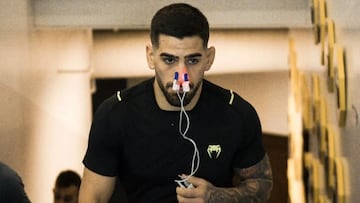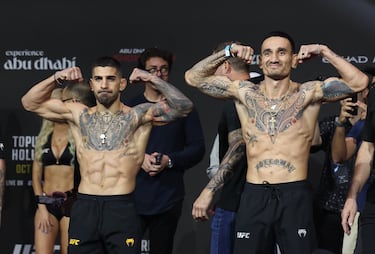Key time for Topuria: 12 hours and 22 pounds of rebound weight
“El Matador” faces a critical window for recovery after his weight cut. His goal: to step into the Octagon weighing over 167 pounds.

Ilia Topuria has already accomplished much of his work for UFC 308 before even stepping into the cage to face Max Holloway. The featherweight champ hit his target of 145 pounds on the scale after an intense weight-cutting process, undoubtedly the most delicate moment of fight week. Once the UFC confirms everything is in order, Topuria’s next hours become crucial in restoring his physical condition.
The second he exits the weigh-in room, Topuria immediately begins rehydrating, working to replenish the substantial fluid loss his body endured, bringing his hydration levels back to normal. From there, he focuses on nutrient intake to get his body’s systems back in full gear, building toward a weight advantage by fight time.
For fighters like Topuria, who are required to weigh in at 145 pounds (65.8 kilograms), the target is to regain around 22 pounds in a single day, a delicate process that must be done carefully to minimize strain on his organs and muscles. According to Dr. Aldo, the mastermind behind Team Topuria’s recovery protocols, their goal is to have Ilia over 167 pounds by fight time.
The importance of the rebound
While it might seem insignificant, entering the Octagon with a few extra pounds than your opponent can offer a competitive edge. At the elite level of competition that Topuria and Holloway fight at, even slight weight differences can be the deciding factor in ground control, takedown defense, or the ability to keep the fight going.
Another area where proper rehydration helps is chin resilience. With correct rehydration, the brain is better protected against strikes, which can be vital in preventing a knockout when taking a heavy punch or kick. Poor rehydration, on the other hand, makes fighters more susceptible to being knocked out in striking exchanges, draining them faster, and clouding decision-making—factors that would be disastrous in a five-round fight like this one.

Rest and nutrition, essential allies for UFC fighters
Since stepping off the scale this morning, Ilia has been undergoing a recovery process that fighters anticipate for weeks. With the weight requirement behind him, he can now focus on rehydration and replenishment. This phase alternates liquid intake with electrolyte and carbohydrate solutions and brief naps, which help his body absorb nutrients. After urinating—a sign that his digestive system is back online—he transitions to consuming solids.
Related stories
This gradual shift from liquids to food starts with semi-liquid, easy-to-digest options like rice creams, honey, peanut butter, or carb-rich purées. From there, he’ll start eating fruits, pasta, rice, and foods high in healthy fats, wrapping up the day with a sweet treat and a more balanced protein-rich meal. By fight day, he’s focused on continuing to fuel up, ensuring Topuria steps into the cage 22 pounds heavier, stronger, and fully primed for a dominant performance.
This article was written by Victor Martin J. before being translated with the help of AI and edited by David Nelson.
Complete your personal details to comment